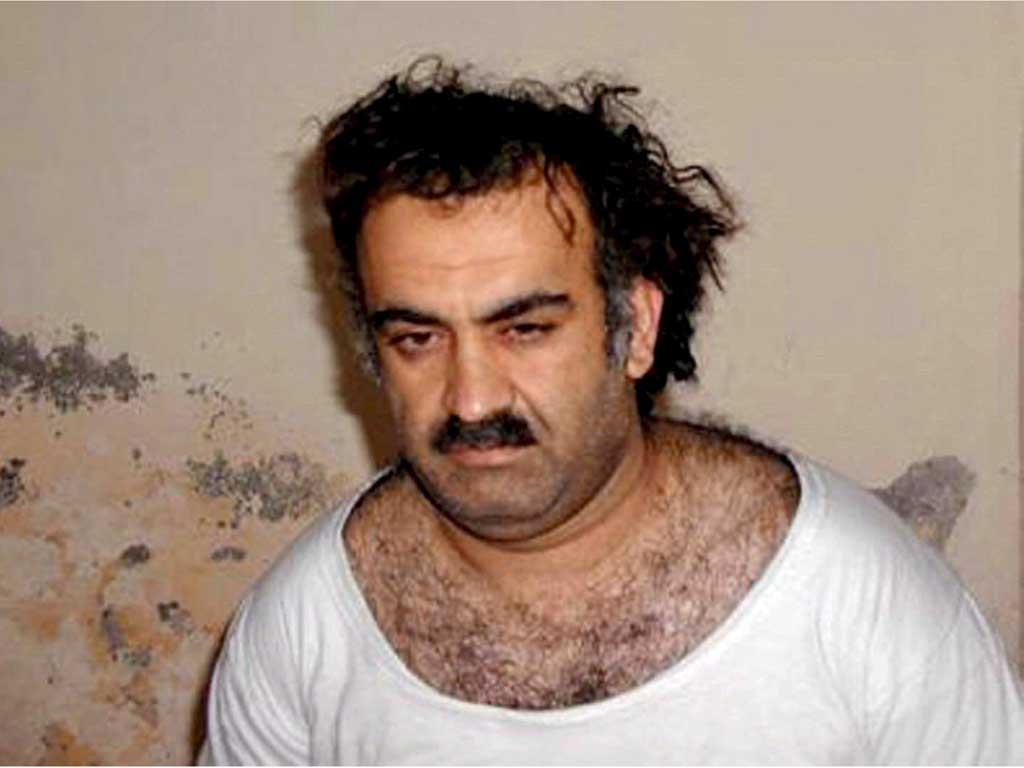Chaos as 9/11 suspects go on trial at last
Alleged mastermind of 2001 attacks refuses to play any part as proceedings open at Guantanamo military tribunal

In circumstances bordering on the chaotic, the US yesterday started its latest attempt to convict the proclaimed mastermind of the 9/11 attacks in a courtroom – and prove at the same time that its much criticised system of military tribunals could deliver a fair trial to Khalid Sheikh Mohammed and his four al-Qa'ida co-defendants, all of whom face the death penalty.
When arraignment proceedings began at 9am local time against the five men, at the Guantanamo Bay military tribunal, it was their first appearance in public for more than three years, since an initial Guantanamo trial was shut down in January 2009 by the incoming Obama administration.
On that occasion, the star defendant sought to confess to the crime, mocking the court and loudly proclaiming his desire for martyrdom. This time, the tactics of the man known as KSM, and those of the four others in the dock, were different.
Looking haggard, with a straggly reddish beard and wearing reading glasses, he took off his earphones, ignored the judge and refused to speak. "I believe Mr Mohammed will decline to address the court. I believe he's deeply concerned about the fairness of the proceeding," his civilian lawyer, David Nevin, declared.
Then two of the defendants left their seats and started to pray next to the tables of their lawyers – watched by US soldiers in camouflage uniform who lined the sides of the courtroom. At one point, Walid bin Attash, who is accused of running an al-Qa'ida training camp in Afghanistan, was placed in a restraint chair.
But the biggest disruption came in late morning, brought about by Ramzi bin al-Shibh, a Yemeni who would, prosecutors say, have been one of the 9/11 hijackers but for being denied a US entry visa. "Maybe you're not going to see us any more," Bin al-Shibh shouted out. "The people at the camp, maybe they're going to kill us and say we committed suicide."
Judge James Pohl, a US Army colonel, tried to keep a grip on proceedings, warning they would continue even in the absence of the defendants. But the circus-like nature of the opening session was a sign that the trial, even when it properly gets under way, could take years to complete. "I can't imagine this will be wrapped up in six months," one defence lawyer old reporters, noting that lengthy appeals would follow.
That prospect will offer no cheer to relatives of the 3,000 who died in the attacks on New York and Washington on 9/11 and on the hijacked plane that crashed in Pennsylvania. A few, chosen by lottery, were in the court. Other family members followed proceedings via closed-circuit TV at military bases on the East Coast.
The five men face charges of terrorism, hijacking and conspiracy, as well as 2,976 individual counts of murder, which carry a maximum penalty of death. But the legitimacy of the military tribunal process is also on trial. The Obama administration took office promising to close Guantanamo, and try the 9/11 prisoners in federal civilian court.
But with both Congress and public opinion opposed, the White House gave up, and reverted to military commissions. New rules have been adopted, tightening the rules of evidence and restricting the use of hearsay. But critics still say information extracted by torture (Khalid Sheikh Mohammed was waterboarded 183 times) makes it impossible to obtain a fair trial.
Join our commenting forum
Join thought-provoking conversations, follow other Independent readers and see their replies
Comments
Bookmark popover
Removed from bookmarks